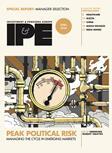New regulations may have to be introduced to make sure central counterparties (CCPs) are robust enough to withstand events that could otherwise cause catastrophic losses within the financial market system, the European Central Bank (ECB) has said.
Benoît Cœuré, member of the executive board of the European Central Bank (ECB), said: “Because of their growing systemic importance, CCPs need to be exceptionally robust, and that means being able to cope with even extreme losses.”
Speaking at an event at the Federal Reserve Bank of Chicago, he said it may be necessary to increase their existing loss-absorbing capacity.
“But what is less clear at the moment is whether this can be done by having CCPs observe the existing, tough international standards, which have been introduced only relatively recently […] or whether there is a need for new requirements that are more demanding or more specific,” he said.
Cœuré said that because of the G20’s commitment to introduce clearing obligations in the wake of the global financial crisis, CCPs had become “super-systemically important”, and it was critical to make sure they were safe.
On the subject of whether authorities should be doing more to address potential weaknesses in CCP risk management, he said that even though standards have been bolstered since the financial crisis, catastrophic losses beyond those already covered by the regulatory requirements could still happen.
“Given the critical role of CCPs in financial markets, regulators need to think the unthinkable,” he said, citing the default of a clearing member at KRX, the South Korean CCP, which had caused it to tap its mutualised default fund.
His warnings comes not long after Jonathan Hill, European commissioner for financial stability, urged the US to work with the EU on new regulation to avoid a “devastating” CCP collapse. The Commission is soon to publish a new resolution framework for CCPs.
Cœuré said mandatory central clearing did allow risks to be pooled, monitored and managed, but that pushing more complex products towards mandatory central clearing made risk management more challenging.
“Authorities may need to assess whether overly complex products should really be submitted to central clearing, so as to ensure CCPs can continue pooling risks in a safe and efficient way,” he said.
There had been concerns recently about whether the level of risk management across the CCP landscape was consistent and adequate, he said.
“New requirements may well prove necessary but the impact and coverage of the existing regulatory framework should first be comprehensively assessed,” Cœuré said.
In order to illustrate how severe the consequences of a “stress event” at a major global CCP could be, he said that in September 2014, the gross notional outstanding amount of centrally cleared positions was estimated at $169trn (€139trn) for over the counter interest rate derivatives, and $14trn for credit derivatives — around ten times US or EU GDP.











No comments yet